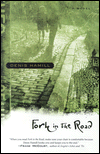
Fork in the Road
Fork in the Road Denis Hammill Pocket Books New York 2000 $24.95 0671016733
Merchandise Links
US Edition:
|
When Irish American filmmaker Colin visits Dublin in search of roots and inspiration, he encounters the vivacious and beautiful traveller Gina Furey when she tries to pick his pocket in the hotel bar. Immediately obsessed, Colin stalks Gina around the city and succeeds in seducing her for a night of grand passion. But a few months later he is contacted by a now-pregnant Gina and he feels obliged to import her to Los Angeles where he’s now living as his filmmaking career takes off. Gina in turn invites her thieving, drinking, brawling, foul-mouthed relations from the poorest part of Dublin to join her in LA’s manicured suburbia, setting the stage for tragic conflict and uproarious slapstick in more or less equal measure.
There have been a great many Irish-American, rich-meets-poor pastiches in recent years, novels and memoirs which slip down easily enough but which hardly investigate Irish-American stereotypes and conventions with any rigour. American attitudes toward Ireland often tend to romanticise the poverty and squalor in which a portion of the population lives. Denis Hammill pulls no punches in his portrayal of this uncouth Irish underclass and Gina’s family and friends are not people to be celebrated for their quaint charm, they are not people you would like to move in next door to, or see your son married to; they are your living nightmare and, without being either sentimental or judgemental – an impressive feat – Hammill makes this clear to us in his portrayal. At the same time, however, and with more lethal venom, Hammill probes the veins of Colin’s neatly mapped-out urban-sophisticate future and jabs at the weak points with unerring accuracy. Colin the filmmaker is disengaged from his own passion and what should be the romantic experience of a lifetime, for example, is reduced by him to an act of observation and gathering of material. And yet his own realisation of this disengagement is not enough to help him to engage – his fate, Hammill seems to be saying, is every bit as unavoidable as Gina’s, and every bit as mundanely tragic.
If this is a book founded solidly on characterisation, it is in its humour that the novel soars. The use of language, of slapstick, of situation comedy are all exceptionally well done, but so too the book is shot through with the darker and more profound humour of the battlefield. Not a book for those with a preference for the anodyne, or indeed for those with a fear of sex and strong language, Fork in the Road is a rich piece of storytelling which hopefully marks a quantum shift in the way Irish Americans view their heritage.
Reviewed by Jennifer Merk
